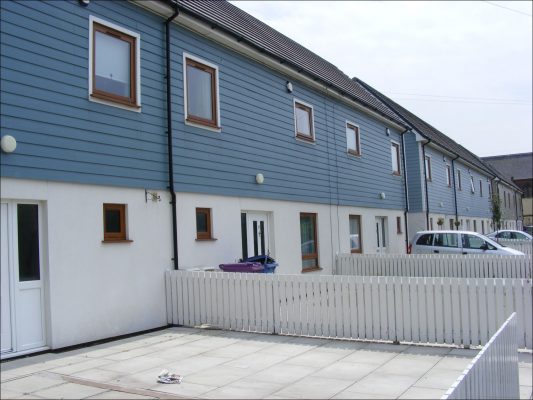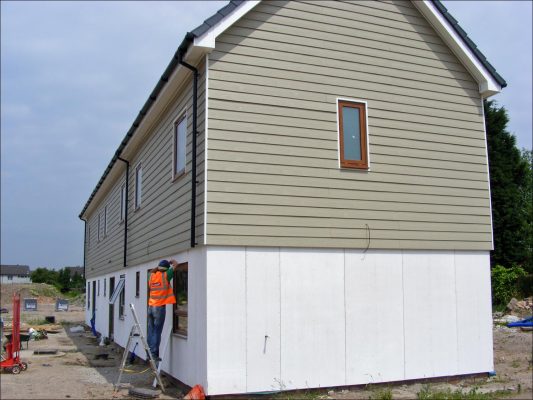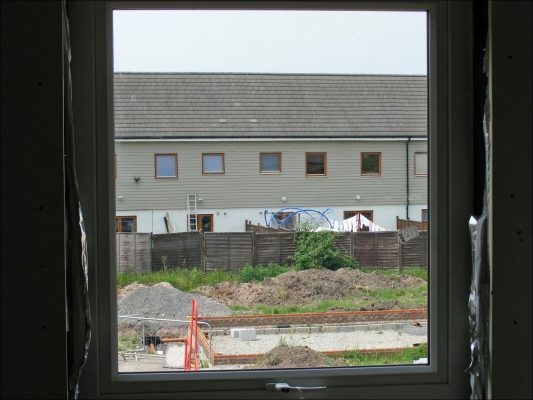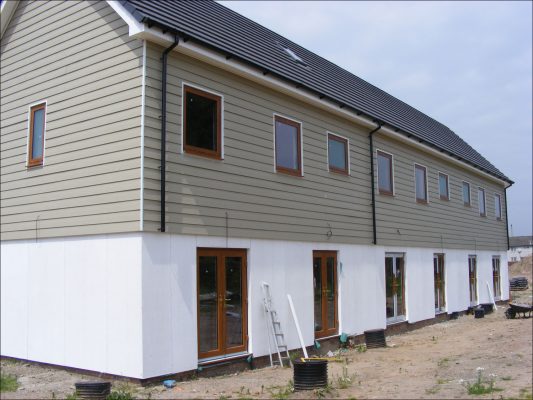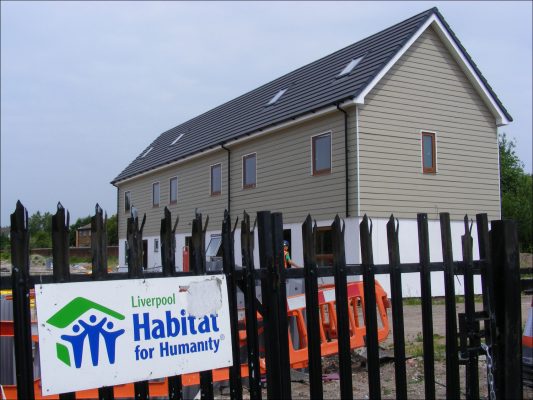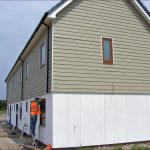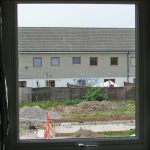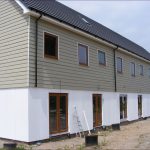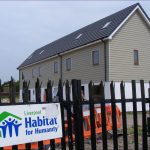 Housing People Building Communities
Housing People Building Communities
-
(HPBC – formerly Liverpool Habitat for Humanity) is a charity dedicated to building affordable housing for low-income families.
- The 2.2 acre site, in the Granby-Toxteth district of Liverpool, was donated by the Roman Catholic Archdiocese.
- All the homes are being built using volunteer labour that complements a small core construction team. Much of the materials have also been donated.
- Planning permission was gained to build 32 houses – the first nine, facing Kingsley Road, were completed in 2008.
- Each volunteering ‘Home Partner’ commits a minimum of 500 hours of their own labour on site helping build their own home. This time input is sometimes called ‘sweat equity’.
- Most of the families living in the first nine houses had no construction skills. A detailed programme identifies every task that the Home Partners can do and ultimately they deliver 90% of the total construction. This reduces the need to buy in sub-contractors. A number of the charity’s core team are qualified plumbers and electricians, and these provide specialist expertise, and formal gas certification is ‘bought in’.
- HPBC also recruits other volunteers to help. These are not people earmarked to live in the finished homes – the charity works with local construction training colleges, and students from abroad, who work on site to help the Home Partners.
- Volunteers from the Army have also helped with the construction of the road and drains via the Military Aid to the Civilian Community (MACC) initiative.
- All the homes have three bedrooms with living room and kitchen on the ground floor; and the bedrooms and a bathroom on the first floor. Residents can adjust the layout a bit and many have opted for an open plan lounge/kitchen. There is also scope to convert the loft into an extra bedroom or living space – creating a house that people can ‘grow into’.
- The houses are all timber framed. The first nine homes there used off-site frames; for the remaining 23 homes the frames are being constructed on site. Concrete composite wall cladding is used, with interlocking concrete tiles on the roof.
- Once the main construction work is complete the Home Partners are also responsible for the internal flooring, decoration and garden.
- Plans are underway to create a children’s playground on the site of a redundant sub-station.
- The Home Partners are selected based on their level of housing need; they also need to reside in the Liverpool City area, and typically they have incomes between £20k and £30k. Applicants who live, work or have a strong connection with the Liverpool 8 postcode area are prioritised.
- The charity is a Christian-based organisation but it stresses that it works with, and is interested in, people of all faiths (and no faiths).
- There is an extremely diverse community evolving. Current residents, and interested parties, include: former asylum-seeking families from Pakistan; a lady in her early 60s, previously living in sub-standard accommodation; and Nigerian families awaiting rehoming from, overcrowded living spaces.
- Funding for the first nine houses came from a variety of sources including Merseyside’s Housing Market Renewal Initiative, the NewHeartlands regeneration initiative, gifts in kind, donations, and, as each property was completed, from the sale of the homes. Initial funding for staffing, to develop the project, came from the now-defunct Maritime’s Heartlands Charity arm.
- However, as the first batch of homes was completed, the project ground to a halt as the charity could not fund the road and infrastructure costs. The offer of help from the Army eventually resolved this and enabled the latest 23 home phase to progress.
- A partnership has also been established with The Sanctuary Group housing association, which is part funding the latest homes. And HPBC also secured a loan from Liverpool City Council (secured by the value of the first nine homes) to provide it with working capital.
- Some generous donations of materials and other support has been secured. For example the £30,000 worth of drainage supplies was donated by Balfour Beatty/Birse Civils, and other significant donations have come from Wienerberger, Bisque Radiators and Whirlpool. Even the local Pret A Manger provides daily lunches for the volunteers.
- The 500 hours of ‘sweat equity’ contributed by each family entitles them to £10k towards their deposit.
- Shared equity mortgages can also be accessed – thereby making the homes affordable to families on low incomes.
- Construction quality is monitored by a Clerk of Works and a Surveyor. They also produce valuations for the funding partners so that money can be drawn down as required.
- Build costs summary:-
- The Sanctuary Group provides £85,000 to deliver each home.
- It costs HPBC £65,000 to construct each unit (this includes a proportional cost of total infrastructure implementation). Each home has approximately 116m2 of accommodation space – giving a per-square-metre cost of approximately £560.
- The surplus £20,000 covers HPBC’s overheads including: staffing; hire of office facilities and storage space; power and water for the site.
- Final values – £117,000-£120,000.
- 2008-2010 – first nine houses completed, facing Kingsley Road.
- May 2012 – road/infrastructure implementation.
- Summer 2012 – building finally continues after delays: construction begins on a further three houses; foundations also dug for an additional four.
- August 2013 – 12 homes complete, work continuing on additional four.
- December 2013 to April 2015 – construction commencement and completion of remaining 20 houses.
- A three bed house does not fit the needs of every family – not enough flexibility. The families should have been assembled first, and then the homes designed to fit/accommodate their needs.
- Ensure up front that the families can afford the homes once they are complete. Don’t get them excited about their potential new home, then dash their hopes by discovering at the eleventh hour that they aren’t eligible for a mortgage.
- Don’t underestimate the generosity of people from the construction sector – tens of thousands of pounds worth of materials have been donated and thousands of free hours work have been contributed.
- Don’t start a project like this unless you really have the finance to finish it. The stop-start approach experienced here inevitably cost extra money, frustrated potential home owners and delayed the project by 2-3 years.


